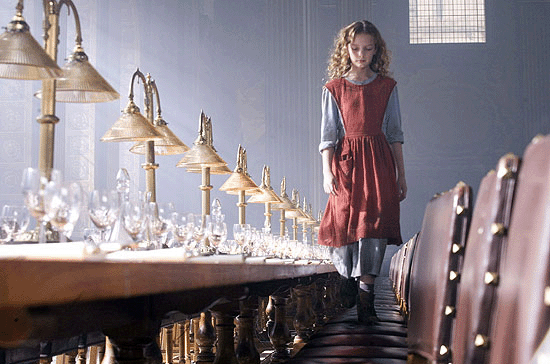This way to Hogwarts
Not having read Philip Pullman’s The Golden Compass is, I suspect, an advantage in watching the film by that same name, which I did on its opening night last Friday. One of my kids, a moderately serious Pullman aficionado, used the word “irritating” within ten seconds of the credit roll at film’s end. Which is to say that his problems with this film were different from my own. The film he saw, I gather, was a badly cut stew of moments from the book – minus its dénouement. The film I saw was an enjoyable enough couple of hours in the theater, a mishmash of every kids’ epic that’s been made over the past few years, with the most recent Bond flick, Casino Royale, tossed in for good measure. Addressing some of my son’s issues with the film – at 113 minutes it tries to tell a story that really deserves a full three hours – might have helped some of mine, tho hardly all.
The primary failure of this film is the director’s inability to envision a complete world in which all of these different actions should take place. A good part of what makes Lord of the Rings or the Harry Potter franchises work literally is their unmistakable distinctness as realities. You know you’re in Middle Earth instantly & completely, and you can stay there for three films running roughly nine hours total. The Potter series isn’t nearly so well done – different directors for different films is a real problem – but you know when you’re at Hogwarts or Diagon Alley. The Golden Compass, on the other hand, gives you its own version of Hogwarts, only much blander, and leads you to a battle on the ice that is lacking only in Orcs, led, by of all things, a bear out of a Coke commercial. There are even a couple of moments right out of Lemony Snicket & Stuart Little. Woe is the media-literate child who tries to make a world out of this collage.
To make it worse, much worse, director Chris Weitz has cast veterans of Lord of the Rings into a couple of important roles – Ian McKellen is the voice of Iorek (pronounced Yorick), the dethroned prince of the ice bears who enters into a contract with Lyra, the girl who seeks to rescue her uncle in the North, and Christopher Lee, Saruman in Lord of the Rings, has a cameo as a key member of the Majesterium, the faux Catholic Church that functions here much the way the Empire does in Star Wars. It would have been far better had Weitz chosen to reverse their roles, giving the Bear the resonating timbre of Lee & not reminding us, every time one or the other speaks, how much better the Ring trilogy is. Eva Green, fresh from Casino Royale, does a turn playing Cate Blanchett/Liv Tyler from LOTR and wouldn’t you know that James Bond (Daniel Craig) is good Lord Asriel himself. Fortunately, Nicole Kidman chews the scenery in her Cruella De Vil imitation – not quite as wicked as Glenn Close, but not bad. Also fortunately, Sam Elliott seems only capable of playing himself, the friendly cowpoke who gives good moustache, so you don’t even notice, almost, that he’s really Han Solo.
Is it any wonder these parts never gel?
Not having read
Much has been made in the media about Compass’ abstention from using the word Church to describe The Authority that is trying to stamp out free will. Frankly, a nomad off the tundra in Tuva could recognize the Majesterium as Catholicism in, oh, maybe eight seconds.






